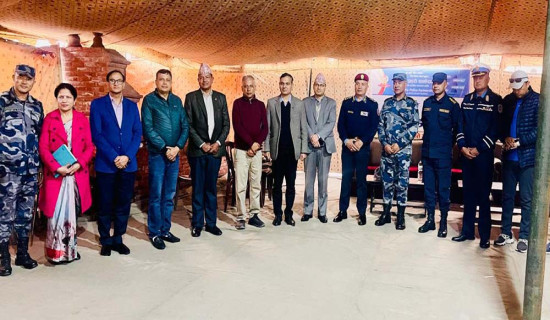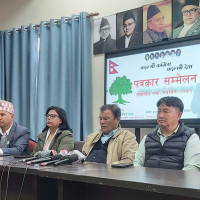- Sunday, 15 February 2026
Security budget up by Rs. 11.25 billion
By A Staff Reporter,Kathmandu, May 31: The government has increased the overall security sector budget for the new fiscal year by over Rs. 11 billion compared to the current fiscal.
According to the new fiscal year book made public after the announcement of the budget by Minister for Finance Dr. Prakash Sharan Mahat on Monday, the government has increased the security sector's budget by Rs. 11.25 billion compared to the current fiscal.
The government has allocated Rs. 252.5 billion budget for the security sectors under the Ministry of Home Affairs and Ministry of Defence for the new fiscal. This is 14 per cent of the total budget (Rs. 1.75 trillion).
The government had allocated Rs. 241.25 billion budget for the security sectors in the current fiscal (2022/23).
The security sectors operating under the Ministry of Home Affairs include - Nepal Police, Armed Police Force Nepal, National Investigation Department, border management and immigration. The Nepali Army operates under the Ministry of Defence.
The Ministry of Home Affairs received Rs. 193.66 billion under which Rs. 184 billion is allocated for recurrent expenditure and Rs. 9.53 billion as capital budget.
Similarly, the Ministry of Defence has received a total of Rs. 58.84 billion budget for the new fiscal, including Rs. 22.5 billion for the Fast Track Road Project alone. Last year, the Fast Track had received Rs. 30 billion budget. Out of total Defence budget, Rs. 53 billion is recurrent expenditure while Rs. 5.66 billion is for capital expenditure.
For the current fiscal year, the Ministry of Home Affairs had received Rs. 185 billion and the Defence Ministry Rs. 55.3 billion.
Finance Minister Dr. Mahat, while presenting the budget in the House of Representatives, said that the capacity of the security agencies would be enhanced timely.
"To maintain law and order and to make the criminal investigation system reliable and trustworthy, all security agencies will be made timely, professional, efficient, modern and resourceful," he said.
"The latest technology will be used to control all types of crimes like organised crime, financial crime, suicide, violence, cyber-crime, criminal activities, including illegal drug trafficking.”
Dr. Mahat said that necessary budget arrangements had been made to upgrade the Digital Forensic Lab to an international standard which is currently at the Nepal Police Office, Maharajgunj.
In the budget statement, it is also stated that police adjustment work would be carried out at the federal and province level in accordance with the federal system.
Since the Federal Police Act has not been enacted, the police have not been adjusted in the province so far. Rather, the province governments have brought the Province Police Act instead of following the Federal Police Act.
The constitution issued in the year 2015 gave the provinces the power to have provincial police to maintain peace and security. However, the leaders of the provinces have been expressing their displeasure saying that the federal government has not given authority to the provinces.
Mahat said that the immigration service would be made simple, convenient and efficient by adopting modern technology.
Similarly, he mentioned in the budget statement that feasibility study of setting up an e-gate in immigration offices would be moved forward.
He also informed that the third phase of infrastructure construction of Nuwakot-based Open Central Jail would be started from the new fiscal. Finance Minister Dr. Mahat also said, "The construction of Naubasta Banke Regional Jail will be completed and put into operation."
For the army, the government has continued the Bunker to Barracks programme. To replace the bunkers used by the army as safe accommodation during the conflict, the Army Headquarters started the 'Bunker to Barracks' project from the fiscal
year 2010/11.
However, even though more than Rs. 1 billion is being allocated annually for the project, over 1,000 structures are yet to be built.
Before the start of the Maoist conflict, the number of the Nepali Army was just 45,000. But after the spate of the conflict in the country, about 55,000 soldiers were added to the army after 2006/07.
However, the physical infrastructure could not be enhanced at the same proportion, and the soldiers had to be kept in bunkers.
Finance Minister Mahat said that through the National Cadet Corps, dedicated, disciplined and loyal youth manpower development work would be continued. He said that the youth trained by the NCC would be used in the fields of disaster and disaster management and humanitarian services.
Dr. Mahat said that Nepal's role in global peacekeeping would be increased at the call of the United Nations. It has also been mentioned in the budget statement that Birendra Peace Operation Training Centre located in Panchkhal would be upgraded as a 'Centre of Excellence'.





-square-thumb.jpg)



-original-thumb.jpg)





